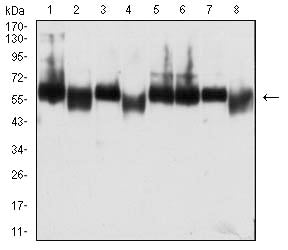
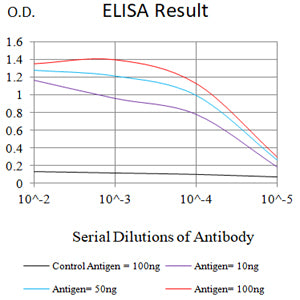
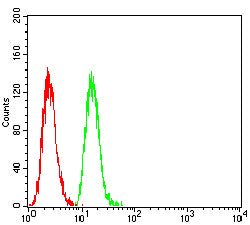
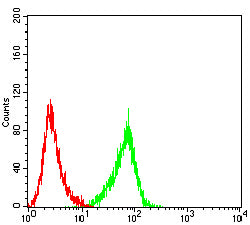
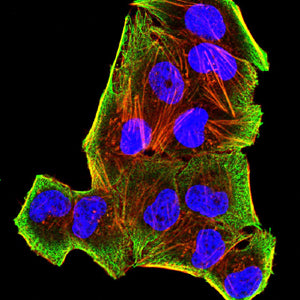
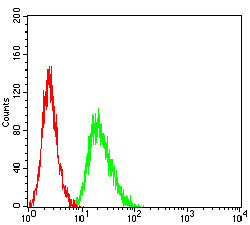
| WB | 1/500 - 1/2000 | Human,Mouse,Rat |
| IF | 咨询技术 | Human,Mouse,Rat |
| IHC | 咨询技术 | Human,Mouse,Rat |
| ICC | 1/200 - 1/1000 | Human,Mouse,Rat |
| FCM | 1/200 - 1/400 | Human,Mouse,Rat |
| Elisa | 1/10000 | Human,Mouse,Rat |
| Aliases | B7DC; Btdc; PDL2; CD273; PD-L2; PDCD1L2; bA574F11.2 |
| Entrez GeneID | 80380 |
| clone | 5F4H10 |
| WB Predicted band size | 31.6kDa |
| Host/Isotype | Mouse IgG2b |
| Antibody Type | Primary antibody |
| Storage | Store at 4°C short term. Aliquot and store at -20°C long term. Avoid freeze/thaw cycles. |
| Species Reactivity | Human, Mouse, Rat |
| Immunogen | Purified recombinant fragment of human CD273 (AA: 20-220) expressed in E. Coli. |
| Formulation | Purified antibody in PBS with 0.05% sodium azide |
+ +
以下是关于CD273(PD-L2)抗体的3篇参考文献示例,包含文献名称、作者及摘要内容概括:
---
1. **文献名称**:*PD-L2 blockade enhances anti-tumor immunity via overcoming adaptive immune resistance in solid tumors*
**作者**:Yearley JH et al.
**摘要**:研究报道了CD273(PD-L2)在肿瘤微环境中的表达及其对T细胞功能的抑制作用。通过开发特异性抗PD-L2单克隆抗体,在多种实体瘤模型中观察到肿瘤生长抑制和T细胞活性增强,提示其作为联合免疫治疗的潜在靶点。
2. **文献名称**:*Structural basis of PD-L2/PD-1 interaction and therapeutic targeting of PD-L2 in autoimmune diseases*
**作者**:Lin DY et al.
**摘要**:通过解析PD-L2与PD-1的复合物晶体结构,揭示了二者结合的关键表位。基于结构设计的CD273抗体在小鼠自身免疫模型中有效缓解疾病症状,证明靶向PD-L2可调节过度激活的免疫反应。
3. **文献名称**:*Dual targeting of PD-L1 and PD-L2 by a bispecific antibody enhances anti-tumor efficacy in preclinical models*
**作者**:Zhang Y et al.
**摘要**:开发了一种同时靶向PD-L1和PD-L2的双特异性抗体。与单一靶向抗体相比,该抗体在黑色素瘤和肺癌模型中显著提高T细胞浸润并延长生存期,表明CD273与PD-L1协同调控免疫抑制微环境。
---
以上文献为示例性内容,实际文献需通过学术数据库(如PubMed、Web of Science)检索确认。
CD273. also known as programmed death-ligand 2 (PD-L2), is a transmembrane protein belonging to the B7 family of immune regulatory molecules. It serves as a ligand for the programmed death-1 (PD-1) receptor, primarily expressed on activated T cells, B cells, and myeloid cells. The PD-1/PD-L2 interaction suppresses T-cell activation and promotes immune tolerance, a mechanism exploited by tumors to evade immune surveillance. Unlike its homolog PD-L1. PD-L2 exhibits more restricted expression under normal physiological conditions, primarily on antigen-presenting cells (e.g., dendritic cells, macrophages) and some epithelial tissues. However, its expression is upregulated in certain cancers, infectious diseases, and chronic inflammatory conditions.
CD273 antibodies are therapeutic or research tools designed to block PD-L2/PD-1 signaling, thereby reactivating antitumor immunity. While PD-L1-targeting antibodies (e.g., atezolizumab) are already clinically established, PD-L2-specific agents remain under investigation. Studies suggest PD-L2 blockade may synergize with PD-L1 inhibitors or benefit patients with PD-L1-negative tumors. Challenges include understanding PD-L2's distinct biological roles, optimizing antibody specificity to avoid off-target effects, and identifying biomarkers for patient stratification. Current research focuses on its dual role in immune suppression and tissue homeostasis, as well as structural differences from PD-L1 that influence binding affinity and therapeutic potential.
×